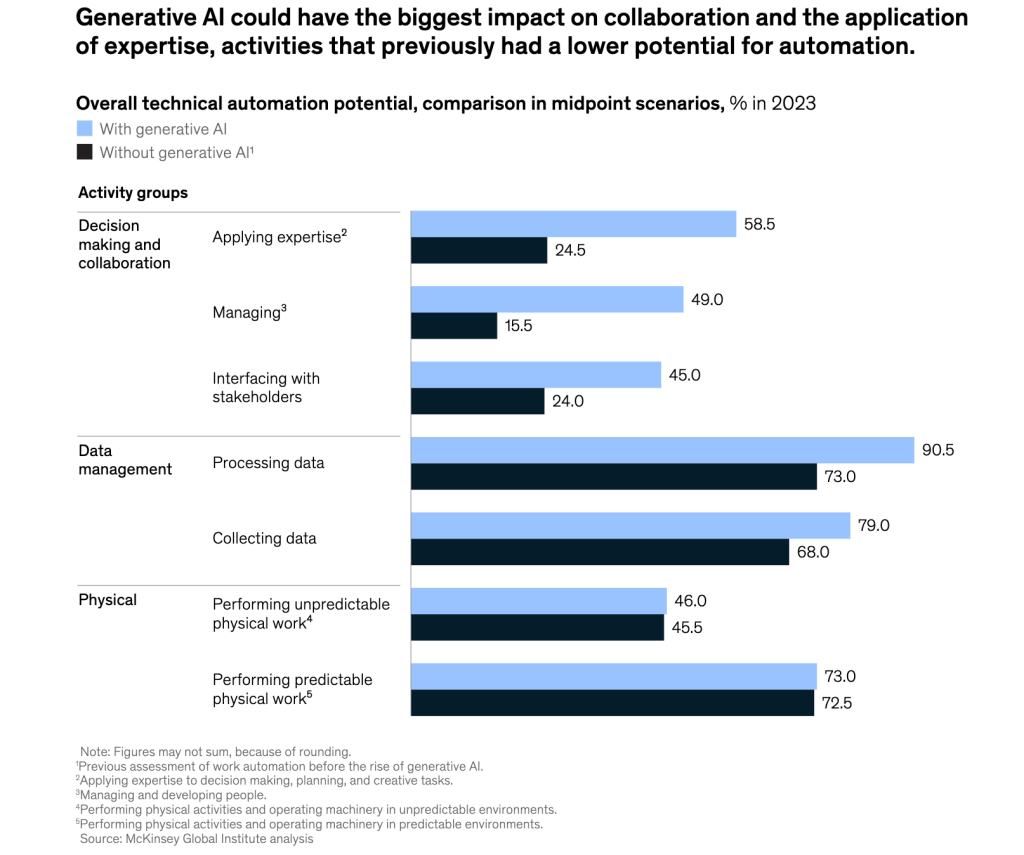McKinsey Global Institute, a renowned consultancy firm, has conducted extensive research on the impact of AI on the workforce, challenging common apprehensions about job loss. Dr. Michael Chui, a leading figure in McKinsey’s research on disruptive technologies, emphasizes that rather than causing widespread job displacement, AI primarily augments human capabilities. Dr. Chui describes these enhancements as “superpowers,” citing historical precedents where machines have empowered workers in various industries.
Insights into job automation
McKinsey’s research methodology involves categorizing approximately 20 to 30 work activities per occupation, revealing that AI predominantly automates specific tasks within jobs rather than entire roles. Dr. Chui illustrates this with examples of generative AI tools such as ChatGPT, which are already revolutionizing various fields, from coding and design to legal analysis and scientific research.
By 2030, McKinsey predicts that 30% of working hours in the United States could be automated, up from 21%, indicating significant but manageable change. Dr. Chui underscores the importance of reskilling workers to adapt to evolving job requirements, highlighting the need for clear guidelines and support systems from employers, policymakers, and broader ecosystems.
Impact across industries
According to McKinsey’s findings, certain sectors will experience more significant disruptions than others. Occupations involving repetitive tasks, data processing, and customer service are most susceptible to automation. Jobs in office support, customer service, and food services, including clerks, retail salespersons, administrative assistants, and cashiers, will likely face substantial transformations.
However, AI’s influence extends beyond routine tasks, affecting higher-wage professions such as writing, law, and consultancy. Dr. Chui emphasizes the need for adaptation across all sectors as AI redefines job functions and allocates work hours differently.
Despite concerns about job displacement, certain industries are poised for growth due to broader economic trends. Demographic shifts, such as an aging population, drive demand for healthcare workers, from nursing aides to surgeons. Additionally, the rise of e-commerce fuels demand for roles in transportation and logistics, compensating for job losses in traditional retail settings.
Industries poised for AI advancements
McKinsey identifies key sectors primed for AI-driven productivity gains, including marketing, software development, customer operations, and research and development. Functional areas crucial to specific industries determine the extent of AI’s potential benefits. For instance, banking stands to gain significantly from AI applications in marketing, sales, and customer interactions. At the same time, life sciences and chemical companies can accelerate drug discovery processes with AI-enabled lead identification.
Dr. Chui underscores the importance of proactive adaptation to seize opportunities in the AI era. Both workers and employers must invest in reskilling initiatives to align with evolving job requirements. Embracing a skills-based labor market can facilitate smoother transitions and ensure inclusivity for underserved communities.
As AI reshapes the workforce, Dr. Chui encourages individuals to familiarize themselves with AI tools and leverage them to enhance productivity and problem-solving capabilities. Employers, in turn, must reimagine job roles, prioritize meaningful work, and explore innovative solutions such as shorter work weeks.
McKinsey’s research offers valuable insights into the transformative potential of AI in the workforce. While concerns about job displacement persist, the key lies in proactive adaptation, reskilling initiatives, and embracing AI as a tool for augmentation rather than replacement. As AI continues to evolve, understanding its impact and leveraging its capabilities will be critical for individuals and industries in navigating the future of work.





